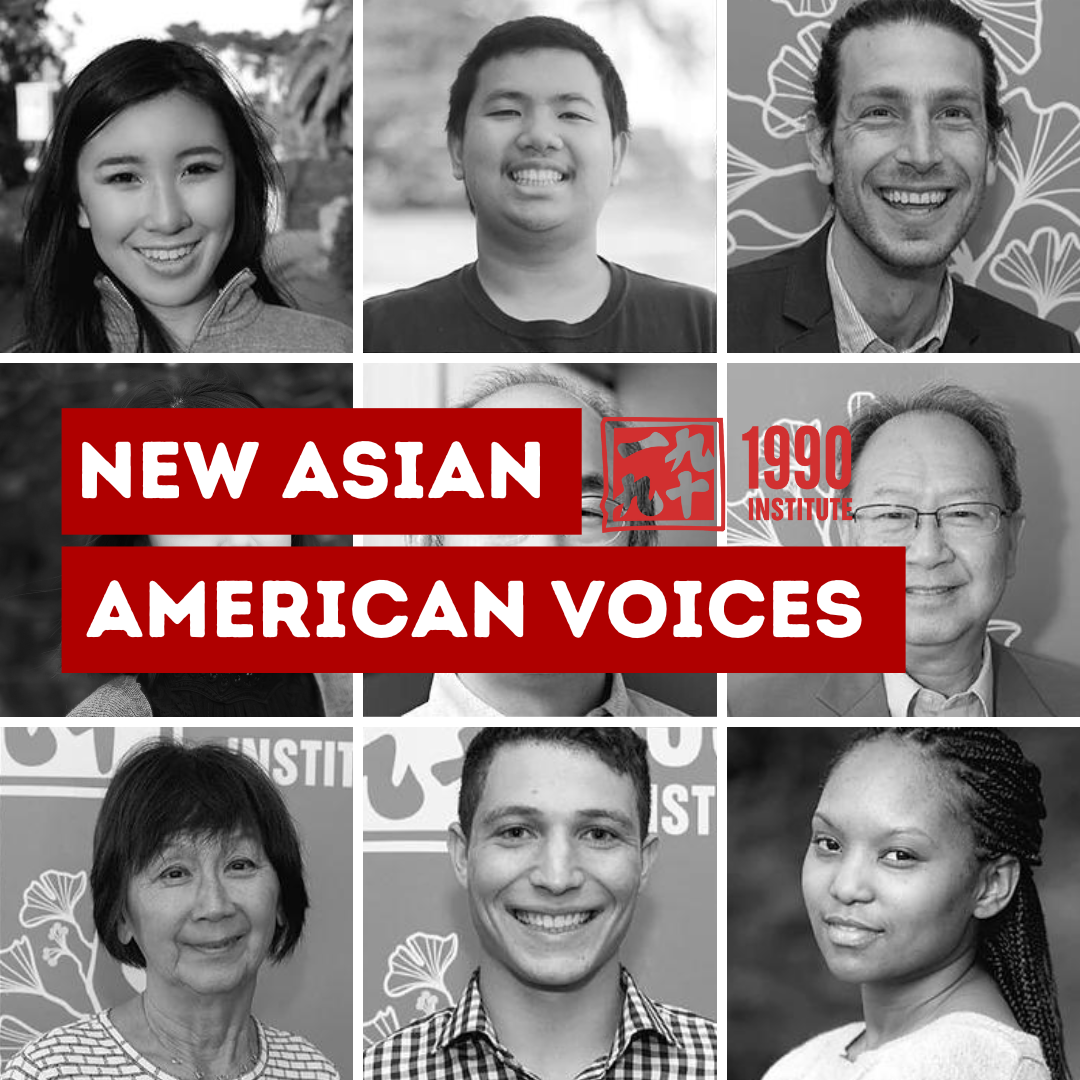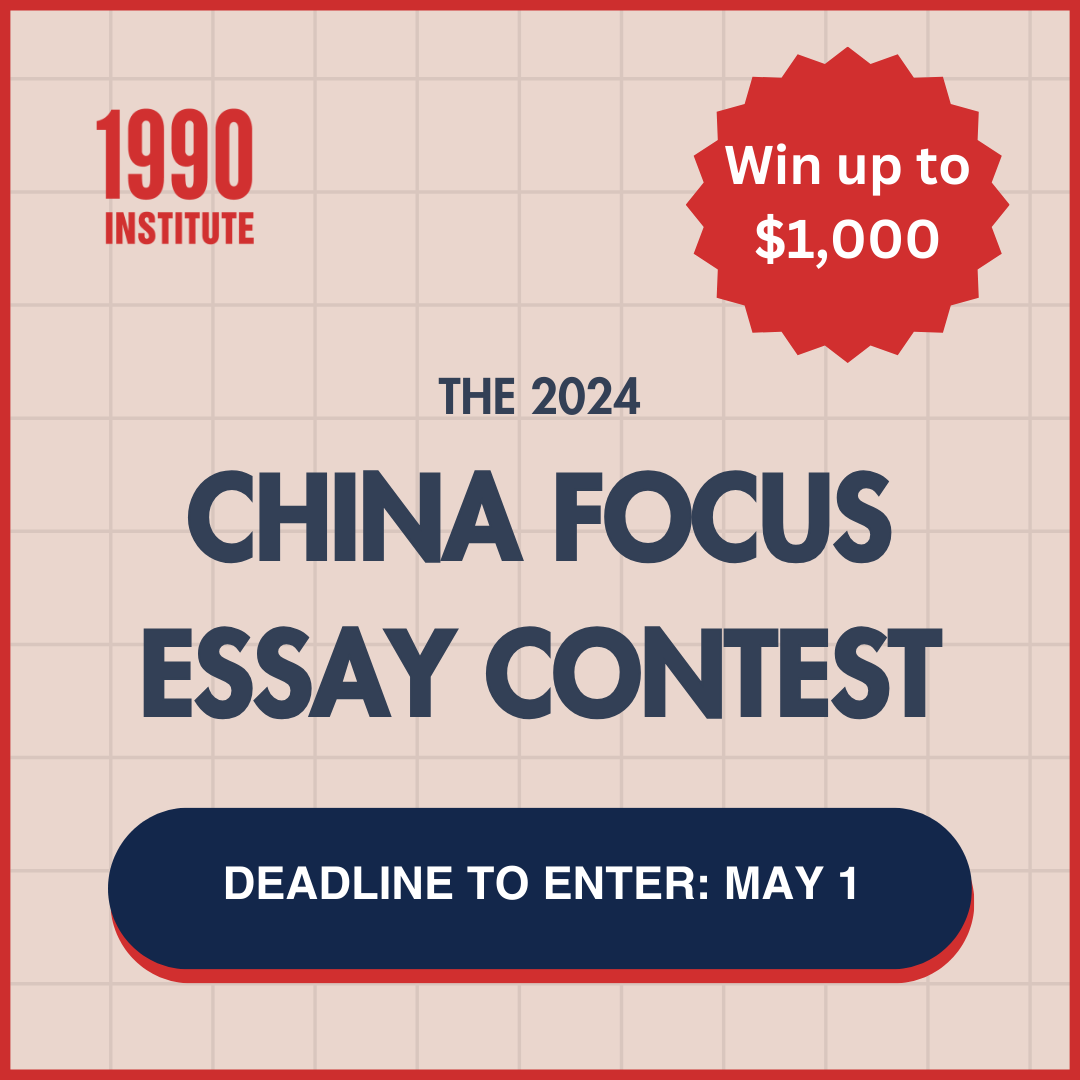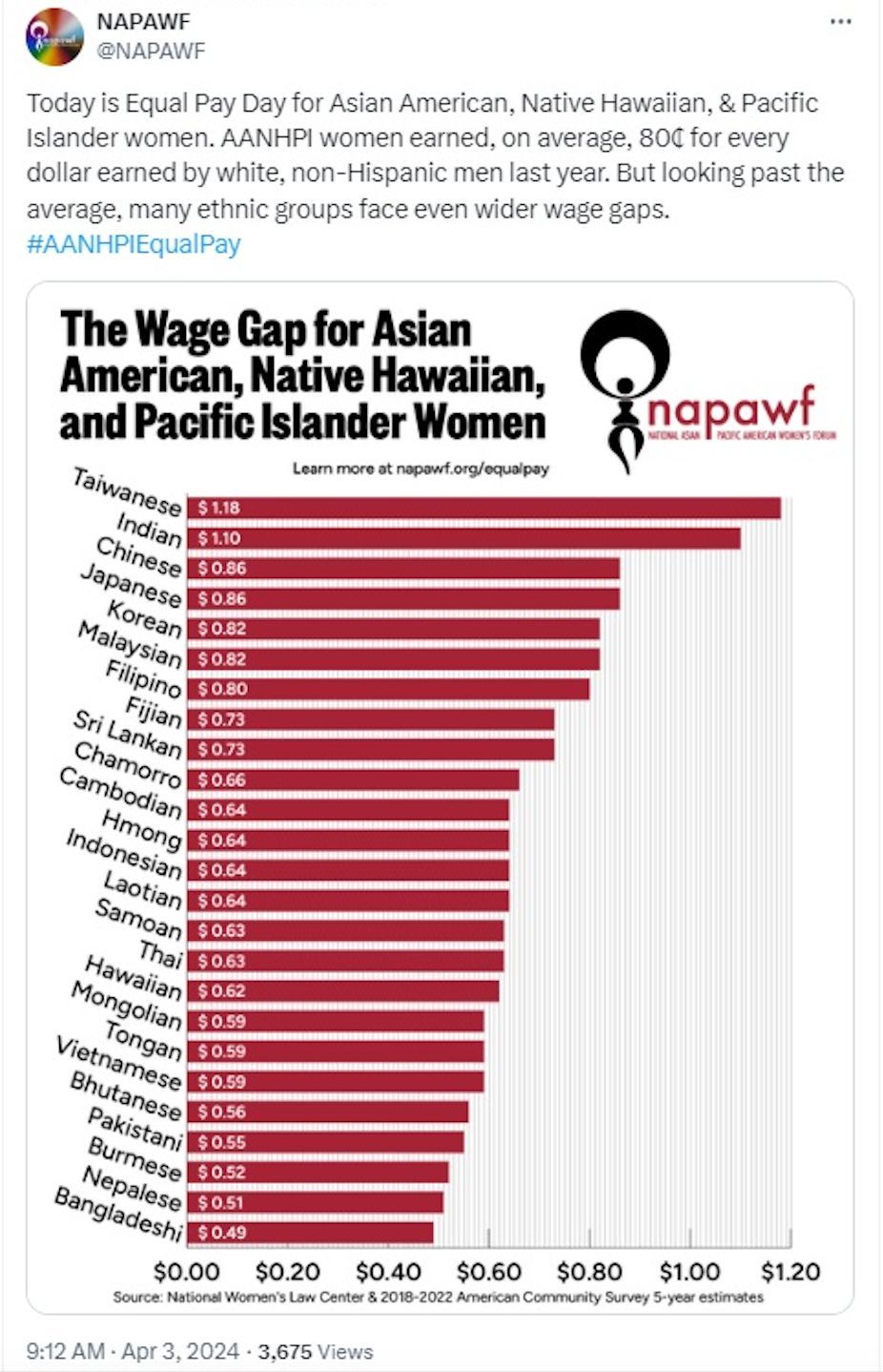|
|
|
|
|
|
|
|
Dear Friends, Asian American, Native Hawaiian, and Pacific Islander Heritage Month is next month and we would like to share a link where you can request a lesson plan on Asian American Identity exclusively created for 1990 Institute followers who are preparing lessons and activities for their middle and high school students in May. The lesson plan builds off our March 6 Teachers Workshop. “Asian American Identity: At the Intersection of Perpetual Foreigner and Pop Culture Trendsetter.” Writer and journalist Jeff Yang, Pew Research Center research associate Ziyao Tian, and education consultant Margaret Yee were our featured panelists who discussed the evolution of Asian Americans identity and the rise and visibility of Asian Americans in pop culture. The recording is on our YouTube channel, and more resources are available in our Teachers Portal and Reference Library. If you are a teacher who attended live or watched the recording, we would like to hear from you. Complete the post-event feedback form and you will be eligible to win a $100 Amazon gift card. Don’t miss your chance to win up to $1,000! The deadline o submit an entry to the China Focus essay contest has been extended to May 1. We are also continuing to celebrate Asian American voices and are welcoming submissions from middle and high school students. Please scroll down to Spotlight for details on these programs and more. We rely on individual contributions to sustain and grow our nonprofit programming which supports teachers and students. If you are able to make a charitable contribution of any amount, we would be so grateful to continue our work. Please share our newsletters with your friends and family and encourage them to subscribe. |
|
|
|
 |
|
|
|
|
|
|
How do you think about community for AANHPI Heritage Month? By Frances Kai-Hwa Wang One of the great things about living in a college town is that Asian American, Native Hawaiian, and Pacific Islander Heritage Month lasts for three months. Because the semester ends the first weekend of May, the university students celebrate from mid-March to mid-April with cultural performances and guest lectures and film festivals. Then the rest of the city continues through the end of May. Every weekend has more amazing food, more Chinese yoyo, more Korean taekwondo, more Indian dancing, more Lao poetry, more Filipino tinikling. Last week I went to hear Uncle George Takei talk about his childhood in Rohwer and Tule Lake concentration camps during World War II. His father taught him that the Japanese concept of gaman, which is often translated as enduring or persevering with patience and dignity, was not just a grit-your-teeth-and-bear-it type of putting up with things, but to find small moments of happiness in the situation. Instead of becoming embittered, his father taught him about the democratic process, and together they began volunteering for political campaigns when he was a teen. He reminded students how important it is to do our part and to vote in this upcoming election. I was reminded of how my father taught me that being Chinese is more than knowing a dance or celebrating a holiday or even eating food (and he loved good food). My father said that being Chinese is about values — values about education, money, family, and community. Like Takei’s father, my father was a community leader, too. I think about community a lot these days. The China Initiative was a Trump-era program that targeted and profiled Chinese American and Asian American scientists and professors. Under then-Attorney General Jeff Sessions, the initiative, started in 2018, othered and accused scientists of espionage and violating national security with little to no evidence. After several cases were acquitted, dismissed, or dropped, the program was ended in 2022 amid accusations of racial profiling. In its wake, careers were ruined, families were traumatized, and talent drained, as scientists weigh the risks of being prosecuted for false accusations about their research. This January, Republicans in Congress tried to revive the program by adding a provision to restart the program into a House appropriations bill. Asian American leaders of the Congressional Asian Pacific American Caucus (CAPAC) stood up for our community and stopped them. “When the Trump Administration first created the China Initiative, we saw how it directed suspicion at researchers and scholars of Asian descent,” said Reps. Judy Chu and Grace Meng and Sen. Mazie Hirono in a statement. “We also saw how it failed to meaningfully safeguard national security or protect Americans from threats posed by foreign entities, including the Chinese Communist Party. Our colleagues in the Republican Party sought to reinstate this failed program because they wanted to look like they were solving problems. But in reality, they were only stoking fear and hatred.” Asian Americans got to where we are in this country today by working hard, but also by taking principled stands and working together in solidarity for the community. The 1990 Institute believes that competition between China and the United States should not cause carte blanc suspicion of Americans of Chinese and Asian heritage by our own government. Competition and security concerns are real but they should not trump Americans' civil rights. Instead, we should move away from stoking fear and hatred. |
|
|
|
|
|
 |
Are you a college or graduate student or recent grad interested in China and U.S.-China relations? Enter our essay contest by May 1 for a chance to win up to $1,000. |
|
|
|
|
|
|
|
1 in 10 Asian Americans live in poverty. Their experiences vary widely, research says | NPR The challenges and opinions around poverty for Asian Americans differed based on age and whether they were born in or immigrated to the U.S. Read the Pew Research Center report, written by Ziyao Tian and Neil Ruiz, who were invited to speak at our workshop on Asian American Identity. Watch this 1990 Institute video for more facts on Asian American diversity: “Numbers Don’t Lie: Model Minority Myth Explained in 3 Minutes.” AAPI Data Celebrates Historic Update to Federal Standards on the Collection of Race & Ethnicity Data | AAPI Data A vital step forward in the movement for data equity, with particular benefits for the diverse Asian American, Native Hawaiian, and Pacific Islander communities. The National Council of Asian Pacific Americans (NCAPA) welcomes the revisions. Pall Of Suspicion | Science The National Institutes of Health’s China initiative has upended hundreds of lives and destroyed scores of academic careers. Some 81% of the scientists cited in the NIH letters identify as Asian, and 91% of the collaborations under scrutiny were with colleagues in China. Faculty and students protest Florida law that they say could keep top Chinese talent out of their grad schools | NBC News “Individuals, they cannot decide where they are born. They’re only thinking of their educational opportunities," one professor said. The House passed a TikTok ban bill. But is the app really a national security threat? | NPR The House of Representatives passed legislation giving TikTok two choices: find a buyer for the immensely popular video app or face a nationwide ban in the U.S. But first it must clear the Senate. Land purchases by Chinese ‘agents’ would be limited under Georgia bill; Democrats say it’s racist | WHEC A bill that would ban any “agent” of China from buying farmland or land near military installations passed the Georgia House over the objections of Democrats who said it would lead to discrimination. Biden speaks with Chinese President Xi Jinping in first call since November meeting | CBS News The White House said the discussion was "candid and constructive" and touched on a variety of bilateral, regional, and global issues. More on the conversation from the South China Morning Post. Russia, chopsticks, oversupply: Everything you want to know about Janet Yellen’s China visit | CNN Over the span of four days, Yellen had wide-ranging meetings with Chinese leaders, local officials, academics, students, and American executives both in the southern metropolis of Guangzhou as well as the capital Beijing. From tragedy to change: Marking three years since metro Atlanta spa shootings | 11 Alive WXIA-TV Three years after the tragedy, the community is still looking for ways to heal from the fallout of the metro Atlanta spa shootings that targeted mostly Asian women. ARTIST, AGITATOR, BUG | University of Washington Magazine University of Washington Bothell Senior Artist-in-Residence Anida Yoeu Ali, a Cambodian American, opens a solo show that fills the Seattle Asian Art Museum with living color. |
|
|
|
Did you know that a serendipitous encounter in April 1971 between two table tennis players from the U.S. and China set in motion a positive change in diplomatic exchanges? Learn more in our video “Ping Pong Diplomacy: Can History Repeat Itself?” |
|
|
|
|
|
|
|
|
|
- DEADLINE FOR THE ESSAY CONTEST EXTENDED TO MAY 1 – The 2024 China Focus Essay Contest is open and accepting entries from college students, graduate students, and recent graduates through May 1, 11:59 pm PT. The contest is organized by China Focus, an online publication at UC San Diego, and is jointly hosted by the 1990 Institute, the Fudan-UC Center on Contemporary China, The Carter Center, and the 21st Century China Center at UC San Diego's School of Global Policy and Strategy. Enter today for a chance to win a $1,000 prize.
- SEEKING STUDENT SUBMISSIONS FOR NEW ASIAN AMERICAN VOICES – Our New Asian American Voices program aims to provide much-needed Asian American visibility and representation in the mainstream by highlighting Asian American individuals and collectives who have made significant strides in all sectors of U.S. society. We are inviting secondary school teachers to engage with their students to submit an Asian American story. We are also welcoming submissions directly from students. These stories can include but are not limited to notable deeds, accomplishments, innovations, positive influences, valuable efforts, and/or meaningful actions that have purpose and significance for a particular community or the greater good. We are especially interested in submissions that include original short-form videos or artwork. Please visit our program on Instagram for examples of the stories and our program webpage for details on requirements.
- WATCH OUR VIDEO ON THE ORIGIN OF PING PONG DIPLOMACY – Did you know the story behind the phrase “ping pong diplomacy” occurred 53 years ago this week? Our video “Ping Pong Diplomacy: Can History Repeat Itself?” is a quick refresher about a chance encounter that led to the formal normalization of U.S.-China relations in 1979 and how sportsmanship and the spirit of ”Friendship First, Competition Second” led to a new chapter in U.S-China relations. In April 1971, two table tennis players – Glenn Cowan from the U.S. and Zhuang Zedong from China – met in Japan for the World Table Tennis Championships. After Cowan missed his team bus and boarded the one with the Chinese team, a friendly encounter with Zhuang led to an invitation from the Chinese government to the U.S. team to visit China. The U.S government responded by removing a restriction on travel to China that had been in place for decades. The trip on April 10, 1971 drew international attention, opening up relations between the two countries and leading to President Nixon’s trip to China the following year.
- PARTNER SPOTLIGHT – THE SERICA INITIATIVE’S AAPI WOMEN’S GALA – Prepare to be inspired at the AAPI Women's Gala 2024 on May 14 in New York City, which celebrates the remarkable journeys of women who embody the essence of the event’s theme, "Strength Unveiled: A Celebration of Women's Success Through Resilience and Perseverance." This gala, hosted by the Serica Initiative, honors the achievements of women with significant ties to Asia – from the AAPI community or Asia or those who have significantly contributed to bridging cultures and fostering inclusion across continents. Sign up for this special night and use partner code PARTNER1990 at checkout for 10% off the gala tickets.
|
|
|
|
Dim Sum - A Little Bit of Heart |
|
 |
|
|
|
|
|
|
|
|
|
|
|
|
1990 Institute
P.O. Box 383 | San Francisco, California 94104
contact@1990institute.org www.1990institute.org Copyright 2023 The 1990 Institute. All rights reserved. |
|
|
|
|
|
|
|
|
|
|
|
|
|